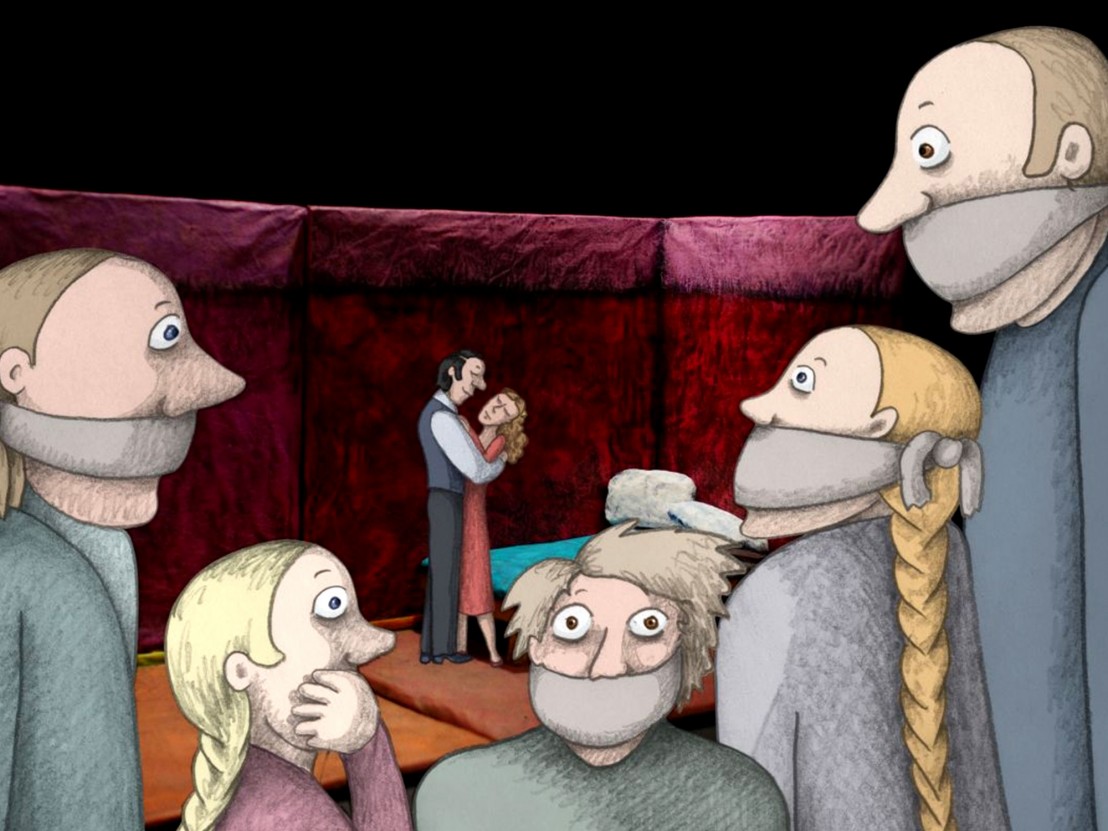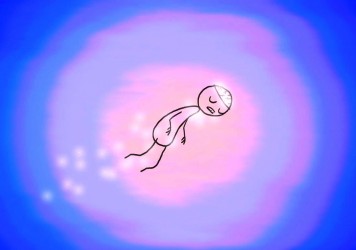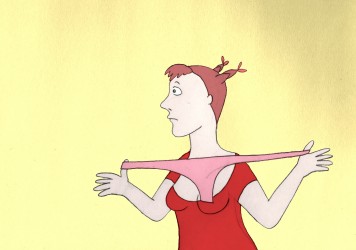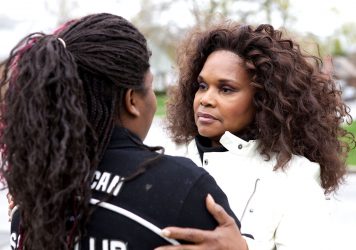
I was checked into a mental hospital at age 22. I saw what happened to people who were given hardcore pharmaceuticals. They were really crude. I’ve heard that now pharmaceuticals are really good and nice with no side-effects and you feel really right. I didn’t have those when I was in mental hospital. They give you a handful of pharmaceuticals and they are hardcore and they numb the whole of your being.
There was one girl who was raped at age 16 and had a nervous breakdown because it was such a traumatic experience. She was brought into mental hospital because of her breakdown. She was given these pharmaceuticals day after day after day. When I saw her she was maybe one year older than me. She had been in the mental hospital seven years at the time and she was practically a vegetable – meaning that she couldn’t put two words together. She would mumble one word over and over, whatever word of the day was, and she would not hold her urine or faeces.
Every time she had to go she would just do it on the floor or in her diapers so she was not fully a human being. I thought it was a punishment for being raped. I was just so frightened that it could happen to me, like if I keep having those nervous breakdowns that I would be turned into this barely human state with the help of pharmaceuticals. I was just so frightened and when I got out of the mental hospital I said, ‘never again – never again I go back there – never again’ and ‘what do I do? How do I survive?’
Since I studied philosophy for five years, I had the tools to research my state and to research how to get better. Through the books and through research I was finding my way of living. One thing that broke me down was that I couldn’t find purpose and meaning in my life. Without having a purpose outside of yourself you cannot survive five minutes of depression. For some people it’s their children, for some people it’s the universe for some people it’s God.
I grew up in a Communist country so I didn’t have the luxury of religion to give me a higher purpose. I had to find it on my own and I found it in the books of Carl Gustav Jung. Carl Gustav Jung saved my life. Reading him and him telling me that life is random (or that was the hint) and you make sense of life by assigning meaning to little events. You walk on the streets, you find a little twig, and that means something. You have to place that twig into the meaning of your day, of your life, because it has a meaning.
In Soviet Union where I grew up there were no psychotherapists, only psychiatrists prescribing medicine, so I didn’t go down that path. When I arrived here in the United States in 1995, I didn’t have insurance. I was extraordinarily poor. For the first two years I was even illegal here so I didn’t have it. I wanted to have therapy. I would love to have therapy but I couldn’t. Now, of course, I probably could but I don’t have time to even think about it.
I have a therapist in my head. This imaginary therapist is around a 79-year-old man and he’s sitting in a chair. He’s very slow and speaks very deliberately. I tell him my questions. I say, ‘Why is this happening?’ or ‘I have a problem with this.’ Sometimes I get very angry and I say, ‘Why am I so angry?’ I just keep telling him what made me angry and I’m asking why I’m so angry at this? Before he can answer, when he’s taking the breath to answer or ask me a question, somehow it hits me, I know exactly why and so he doesn’t have to say anything. I don’t think I ever heard him say anything. Just me talking to him in my head brings me to the answer.
You become a filmmaker, you become an artist, and then you discover why you’re doing this stuff. You have to answer that, very clearly. Everything that I do is against my economic self-interest. I’m practically destroying my bank account because I’m making films. So why am I doing this? Why am I destroying my health sitting at my table working all these long hours? Why? The reason, I think, I made an answer for myself is that… So, there is this mainstream entertainment that reproduces the same three ideas, the same three stories, because that’s what we see from Hollywood.
Independent animation has been a little hijacked as well. Rocks in my Pockets is one person’s voice, one person’s view. It’s one person’s vision and it goes into the space of the diversity of thought. It supports the diversity of thought. If you only consume mainstream entertainment you get fed certain ideas but there is this other space for diversity of thought and I think my films and thousands of other people’s films support that diversity of opinion.
I feel that as a species we need the diversity of thought because if you have only one way of looking at the world you are not accustomed to being contradicted. When you have contradictions in your life and there are different ways of looking at things you are more capable of managing these contradictory thoughts in your head. And you are also able to find solutions to pressing problems. That’s my view. So, for me, I feel like I am working towards creating and supporting this diversity of thought.
On one hand I’m happy that people are getting diagnosed with mental illness because it puts a name on a certain human condition and it helps you to understand yourself better. I like to have a name. When you say I’m bipolar it alerts me to my condition and I can say, ’Ohh, I have these ups and now I’m on an up.’
On one hand the term ‘bipolar’ makes me understand my condition. On the other hand I feel like there’s no mental illness. There isn’t. There’s none. There’s zero. Everything that we go through is a human condition. When you say, ‘You are schizophrenic’ you’re putting a new identity on me: that I am a patient, that I am mentally ill, but I am not! I am just a human being who has slightly different brain function. And once someone says, ‘You are schizophrenic’ or ‘You are bipolar’ you put a diagnosis on me and now that’s my identity. Now my identity separates me from you.
I don’t know if we are getting over-diagnosed. Now there are all these shades – like this kind of depression, that kind of depression – and it’s all very helpful but at the same time once you identify as bipolar you can make all these excuses. You can say, ’I’m mentally ill!’ but you’re not! You’re just human. I don’t know. It’s just a complicated thing, In some cultures, for example, people who were schizophrenics and heard voices, they were seen as spiritual gurus because they heard dead people in their ears. They had superpowers and that was a good thing. Now in Western society hearing voices is a very bad thing, right.
It’s like you’re mentally ill, you get diagnosed, you get shut in a mental hospital. But what if there’s something magical about hearing voices? I’m not an expert. I’m just questioning this. It’s a question. I’m struggling with this myself. How much do we need to be put in a box of ‘bipolar’ you know? Does it really help? I mean it helps to a certain extent but how different is that from just being human?
Experiencing depression – maybe it’s a normal thing? Maybe it’s a normal thing if you know how to handle it but now you go to a psychologist and you say, ‘I have this inner pain. My husband died and I’m in this pain,’ instead of dealing with the pain he prescribes you medicine and dulls the pain and he’s done with his work. I don’t know. I don’t have an answer. It’s all just questions.
I made a lot of films about sex and when you present films about sex in front of thousands of people and then you make a film about your personal depression, depression compared to sex, it’s not as bad. Sex is a very powerful subject. When I put out a film about sex I was frightened what other people would think about me. People did think weird thoughts about me. Then I made another film about sex. I just keep making them. But the thing is I am frightened. When people say, ’Oh, it looks like you don’t care what people think about you,’ I’m like, ‘No, it’s not true. I care deeply what people think about me, and I’m frightened.’ I live in constant fear about what people think of me. I don’t know what urges me to just to put it out.
When I was a young child I had to go three kilometres to school by foot. I had to go through a cemetery, through a park, through abandoned places. That was a three kilometre walk at 7 in the morning in the dark and then at night, in the evening and there were all these stray dogs. My dad said, ‘When you meet a stray dog, don’t show him your fear. When you see a stray dog just walk as you’re walking normally. Don’t change your path. Don’t even look at the dog. Don’t acknowledge the dog and nothing’s going to happen to you.’
So when I was walking I was, what, 8-years-old. I walk through this park and then this stray dog shows up. He sees me and he’s nearly bigger than me. He can do anything to me. He comes and stands right in front of my path where I have to go and he looks at me, challenging me. My heart starts to pound and I’m full of fright but I remember my dad’s advice and I walk right to where I was going to walk: my path. I was coming closer to the dog and at the last moment, the dog stepped aside. I didn’t even acknowledge the dog and just walked through. This is how I live. I am afraid of the judgment but there is something I have to do as an artist and I just keep doing it even if I’m so frightened.
When you have an artistic project, there’s no way you that you can not get out of bed. For example, I worked on Rocks in my Pockets for four years – now I should say five years because all of this distribution and promotion is part of the project. Nobody asked me to make it. There’s no company, no corporation that came knocking on my door saying, ‘We’ll give you $10,000. Make this film.’ No. I started it myself and it means that if I don’t sit down at the table and work and create a couple of drawings a day, nothing will happen. Nothing will happen. The project will not be made. Let’s say you are a bank clerk and are hired by the bank. If you can’t get out of bed in the morning and you don’t go to work, eventually you will be replaced because the work that you do is not that unique.
It is not that irreplaceable. The work I do… If I don’t do it then nobody else can do it. That is a huge motivation to overcome my pain and get out of bed. Also, I have to say that when I was in my twenties, very often I tried that strategy of, ‘Because it’s so painful I can’t move, let me just sleep it off.’ Then I found out that you cannot sleep it off. It just gets worse if you indulge it. If you follow that feeling of, ‘Oh, I’m going to rest up. It’s going to get better.’ No, it doesn’t. I discovered that it doesn’t work so I know that I cannot not get out of bed so I have to get out of bed.
In a normal day I can create 30 to 50 drawings. When I’m depressed I can create two drawings or three drawings and they are shit. They look like shit. They feel like shit. They are horrible. Then I go on an upswing to the manic phase. When I’m in a manic phase I can create 80 to 90 drawings a day and they seem perfect and genius. I’m the best thing! Then when I’m going down from the manic phase I look at them again and I’m like, ‘God! They’re horrible’ but then the drawings that I did when I was depressed are not so bad. It’s interesting for me to have these manic phases and depressive phases.
I feel like I have this journey and relationship with reality that people that just go through depression – or they don’t have depression or manic phases – that they don’t quite have. I actually think that I’m able to see reality in these extremes, like extremely negative – life stripped down from all the meaning, from all excitement, from all the colours and I’m able to see it fully charged, full of meaning, purpose and colours, so vivid and then I can see things the way they are. I have three states of dealing with reality, three states of mind. I think it’s quite amazing and interesting to have these perspectives where some people only experience one way of looking at the world.
I have been with my boyfriend since 2000 and it’s probably the best thing that ever happened to me. I was perfectly capable at the age when I met him to make the right choices and also had learned enough to be able to sustain the relationship. You know relationships are give and take. I also think that he is a perfect person for me. Unlike all these other relationships that I had that were very demanding. Some men really didn’t like me doing my own thing, you know, like being an artist. They kind of felt possessive and jealous.
There was my first marriage. He was an alcoholic. That was a difficult relationship. My second marriage was based on a lie. He lied about who he was so I made these bad choices and also I was incapable of sustaining my own emotions about relationships. When I met my boyfriend I not only met he right person but, as a person, I was ready for a good relationship. I think that relationships are extraordinarily important for our mental balance. First, because it’s a shared life.
When you are just cooking in your own juice you can only have so much flavour. And then the other person comes into your life and suddenly you see the world from the other person’s perspective. Very often you say, ‘I have this weird thought’ and you have another adjusted person that understands you from day to day – like you see your friends on, I don’t know, a weekly basis but a person who you share toothpaste with, a person who you share the day with and the daily conversation, they get to know parts that other people will never know. It’s very, very important. They are able to offer perspective on your life but they also bring this other life in your life. I think it’s just amazing to have relationships. We humans need relationships. We cannot be alone.
Published 17 Aug 2015

By Sarah Jilani
The medium once described as “anti-cinema” is pushing the boundaries of the artform.

Check out this choice cut from director Signe Baumane’s brilliant The Teat Beat of Sex series.

It’s possible for a movie to have a positive impact on society and the individual.